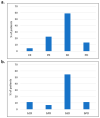Metronomic Chemotherapy Based on Topotecan or Topotecan and Cyclophosphamide Combination (CyTo) in Advanced, Pretreated Ovarian Cancer
- PMID: 36831410
- PMCID: PMC9954570
- DOI: 10.3390/cancers15041067
Metronomic Chemotherapy Based on Topotecan or Topotecan and Cyclophosphamide Combination (CyTo) in Advanced, Pretreated Ovarian Cancer
Abstract
Patients with advanced ovarian cancer (OC) have a detrimental prognosis. The options for systemic treatment of advanced OC in later lines of treatment are limited by the availability of active therapies and their applicability to often fragile, exhausted patients with poor performance status. Metronomic chemotherapy (MC) is a concept of a continuous administration of cytotoxic drugs, which is characterized by multidirectional activity (anti-proliferative, anti-angiogenic, and anti-immunosuppressive) and low toxicity. We have performed a retrospective analysis of consecutive, advanced, chemo-refractory OC patients treated with MC based on single-agent topotecan (1 mg p.o. q2d) or on a topotecan (1 mg q2d) and cyclophosphamide (50 mg p.o. qd) combination (CyTo). Metronomic chemotherapy demonstrated promising activity, with 72% and 86% of patients achieving biochemical or objective disease control and 18% and 27% of patients achieving a biochemical or objective response, respectively. The median PFS in the whole population was 3.65 months, but the median PFS in patients with a biochemical response to MC (18.2% of patients) reached 10.7 months. The study also suggested that overweight or obese patients had significantly better outcomes on MC than patients with BMI <25 kg/m2. This article is the first report in the literature on metronomic chemotherapy based on a topotecan + cyclophosphamide combination (CyTo). The CyTo regimen demonstrated safety, clinical activity, and potential broad clinical applicability in advanced OC patients and will be evaluated in a forthcoming clinical trial.
Keywords: BMI; metronomic chemotherapy; ovarian cancer; salvage treatment; topotecan; topotecan + cyclophosphamide.
Conflict of interest statement
The authors declare no conflict of interest.
Figures




Similar articles
-
Analysis of acquired resistance to metronomic oral topotecan chemotherapy plus pazopanib after prolonged preclinical potent responsiveness in advanced ovarian cancer.Angiogenesis. 2014 Jul;17(3):661-73. doi: 10.1007/s10456-014-9422-9. Epub 2014 Feb 26. Angiogenesis. 2014. PMID: 24569856 Free PMC article.
-
Optimal chemotherapy treatment for women with recurrent ovarian cancer.Curr Oncol. 2007 Oct;14(5):195-208. doi: 10.3747/co.2007.148. Curr Oncol. 2007. PMID: 17938703 Free PMC article.
-
High-dose topotecan, melphalan, and cyclophosphamide (TMC) with stem cell support: a new regimen for the treatment of advanced ovarian cancer.Gynecol Oncol. 2001 Sep;82(3):420-6. doi: 10.1006/gyno.2001.6326. Gynecol Oncol. 2001. PMID: 11520135 Clinical Trial.
-
Metronomic Chemotherapy in Prostate Cancer.J Clin Med. 2022 May 18;11(10):2853. doi: 10.3390/jcm11102853. J Clin Med. 2022. PMID: 35628979 Free PMC article. Review.
-
Efficacy and safety of topotecan in the treatment of advanced ovarian carcinoma.Semin Oncol. 1997 Feb;24(1 Suppl 5):S5-19-S5-25. Semin Oncol. 1997. PMID: 9122738 Review.
Cited by
-
Enhancing cancer immunotherapy: Nanotechnology-mediated immunotherapy overcoming immunosuppression.Acta Pharm Sin B. 2024 Sep;14(9):3834-3854. doi: 10.1016/j.apsb.2024.05.032. Epub 2024 Jun 3. Acta Pharm Sin B. 2024. PMID: 39309502 Free PMC article. Review.
-
Oral Metronomic Therapy: An Effective Palliative Treatment Option for Epithelial Ovarian Cancer.Cureus. 2024 Nov 6;16(11):e73171. doi: 10.7759/cureus.73171. eCollection 2024 Nov. Cureus. 2024. PMID: 39650914 Free PMC article.
-
The association of rs25487 of the XRCC1 gene and rs13181 of the ERCC2 gene polymorphisms with the ovarian cancer risk.Biomol Biomed. 2025 Apr 3;25(5):1197-1204. doi: 10.17305/bb.2024.11314. Biomol Biomed. 2025. PMID: 39699591 Free PMC article.
-
Predictive Value of the KELIM Index for Progression-Free Survival in Ovarian Cancer Under Current Treatment Modalities.Int J Womens Health. 2025 Jul 23;17:2291-2297. doi: 10.2147/IJWH.S533323. eCollection 2025. Int J Womens Health. 2025. PMID: 40726508 Free PMC article.
-
Metronomic chemotherapy and drug repurposing: A paradigm shift in oncology.Heliyon. 2024 Jan 14;10(3):e24670. doi: 10.1016/j.heliyon.2024.e24670. eCollection 2024 Feb 15. Heliyon. 2024. PMID: 38314272 Free PMC article. Review.
References
-
- Cancer Registration Statistics, England Statistical Bulletins—Office for National Statistics. [(accessed on 28 December 2022)]; Available online: https://www.ons.gov.uk/peoplepopulationandcommunity/healthandsocialcare/....
-
- Dion L., Mimoun C., Timoh K.N., Bendifallah S., Bricou A., Collinet P., Touboul C., Ouldamer L., Azaïs H., Dabi Y., et al. Ovarian Cancer in the Elderly: Time to Move towards a More Logical Approach to Improve Prognosis—A Study from the FRANCOGYN Group. J. Clin. Med. 2020;9:1339. doi: 10.3390/jcm9051339. - DOI - PMC - PubMed
Grants and funding
LinkOut - more resources
Full Text Sources

